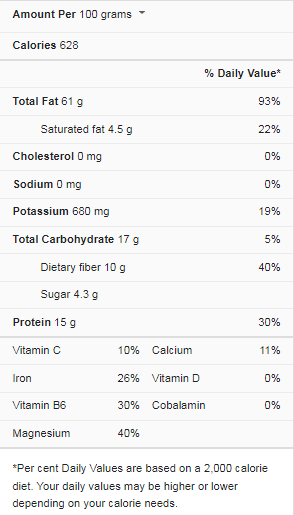Hazelnuts are high in antioxidants, which protect the body from oxidative stress, which can lead to hypertension. They’re high in phenolic chemicals, which help keep your heart healthy by lowering cholesterol and inflammation.
Hazelnuts are used in baking and sweets, confectionery to make praline. In chocolate truffles and other chocolate-based items, including chocolate bars, hazelnut cocoa spreads like Nutella and Frangelico liqueur. Hazelnut oil, extracted from hazelnuts, has a rich flavor and is used in cooking. The world’s two largest hazelnut producers are Turkey and Italy. The hazelnuts’ nutrition table below shows protein, monounsaturated fat, vitamin E, manganese, and other essential nutrients.
Hazelnut Nutrition Facts
Health Benefits Of Hazelnuts
Hazelnuts are a delicious snack and a terrific complement to various recipes. Nuts have various health benefits when included in a well-balanced, calorie-controlled diet.
Supporting Healthy Bowel Movements
Hazelnuts are high in fiber and can be consumed as a snack. Dietary fiber is abundant in hazelnuts. Fiber-rich foods promote regular bowel motions and help prevent constipation. Dietary recommendations according to Trusted Source in the United States, women between the ages of 31 and 50 should consume 25.2 grams (g) of dietary fiber per day. 30.8 grams of fiber per day is recommended for men in the same age group. Hazelnuts have approximately 10% of dietary fiber in a 100g serving.
Obesity Prevention
Nuts may help some people gain less weight, according to recent studies. Nut eating was linked to less weight gain and a lower risk of obesity in a 2018 study. Participants in the study who ate more nuts were less likely to gain weight than those who did not. While the study found an association, more research is needed to determine whether there is a causal link between eating nuts and a lower risk of weight gain.
Protecting Against Cell Damage
Antioxidants, which are chemicals that protect cells from oxidation, are abundant in hazelnuts, and they minimize the amount of free radical damage to cells. The antioxidant vitamin E is found in hazelnuts. Some research suggests that vitamin E may protect the body from cancer-related cell damage.
Cholesterol Reduction
Hazelnuts may help lower cholesterol levels. According to a study from 2013, A hazelnut-rich diet was found to lower participants’ levels of low-density lipoprotein cholesterol according to Trusted Source. This form of cholesterol has been linked to an increased risk of heart disease. The researchers concluded that eating hazelnuts every day without increasing a person’s overall calorie intake was the best way to receive hazelnuts’ health benefits. The findings of a 2016 review of Hazelnuts, according to Trusted Source, may help lower dangerous cholesterol levels.
Insulin Sensitivity Improvement
It’s possible that eating a nut mix with hazelnuts will help you increase your insulin sensitivity. A tiny 2011 study indicated that eating a 30-gram nut mix including 7.5 grams of hazelnuts every day for 12 weeks enhanced participants’ insulin sensitivity. Insulin sensitivity is reduced, which contributes to the development of type 2 diabetes. Improving this sensitivity lowers the likelihood of developing the disease.
Keeping Your Heart Healthy
Hazelnuts may aid in the maintenance of a healthy heart. According to a 2013 study, consuming a diet high in hazelnuts can enhance cardiovascular risk indicators, potentially lowering the risk of heart disease.
Reducing Inflammation
Inflammation may be reduced by eating hazelnuts. In a 2013 study, participants who ate a hazelnut-rich diet showed fewer indications of inflammation. Another study, on the other hand, found that the change in inflammatory markers after consuming hazelnuts was negligible. More research is needed to determine the effect of hazelnuts on inflammation.
Is It Possible To Consume A Raw Hazelnut?
Hazelnuts, also known as cobnuts or filberts, are delicious raw, but they take on a more mellow, sweeter flavor when roasted. They have a high-fat content, like practically all nuts, which means they’ll become rancid soon if not refrigerated. Hazelnuts are sweet and can be consumed raw, roasted, or ground into a paste. Hazelnuts, like other nuts, are nutrient-dense, with high levels of protein, lipids, vitamins, and minerals.
The hazels are safe to eat once the papery outer coating breaks away from the nut. Because ready-to-eat nuts are difficult to come by, you can select them when they’re green and store them in a warm, dry, dark spot, such as an airing cupboard, to ripen.
How Many Hazelnuts Should You Eat A Day?
A handful of hazelnuts can be pretty beneficial! Hazelnuts are good for your heart. According to the FDA*, eating just 1.5 ounces of hazelnuts per day can help lessen the risk of cardiovascular disease. Hazelnuts are the highest Folate content among tree nuts, providing 8% of your DV per serving. Eating 29 to 69 grams of hazelnuts per day has been associated with improved heart health measures in general.
The researchers concluded that eating hazelnuts every day without increasing a person’s overall calorie intake was the best way to receive hazelnuts’ health benefits. According to a 2016 review, hazelnuts may help lower dangerous cholesterol levels.
Is It True That Hazelnuts Help You Lose Weight?
Hazelnuts can help you lose weight by promoting a healthy metabolism. When it comes to losing weight, we frequently attempt to avoid tree nuts, but the truth is that some nuts can help you lose weight faster. In short, yes, we should eat them, and no, if consumed in moderation, they will not cause us to gain weight. The fats found in nuts are primarily “good” fats.
Apart from that, our bodies do not absorb all of the nuts’ fat; however, the nutrients they give are absorbed. Eating more hazelnuts may help you lose weight by feeling fuller for longer. To reduce weight, you should take at least a handful or 30 grams of these nuts every day, exercise, and have a nutritious diet.
Is It True That Hazelnuts Are Healthier Than Almonds?
Summary. Almonds are higher in minerals, protein, fiber, and carbohydrates than hazelnuts, have fewer saturated fats, have lower GI, and are less expensive. On the other hand, Hazelnuts have more vitamins, fewer carbohydrates, and lower sodium than almonds. Almonds, pistachios, walnuts, peanuts, and hazelnuts are high in protein, fat, fiber, vitamins, and minerals, among other nutrients.
When consumed as part of a nutrient-dense diet, Nuts may help lower your risk of heart disease and boost your immune system, among other things. Macadamia nuts and pecans have the most excellent calories – 200 per ounce – while also having the minor protein and the most fats.
What Does It Taste Like To Eat Hazelnuts?
Hazelnuts have a nutty, roasted flavor with faint hints of musty and earthy aromas. Fiber tone is one of the essential taste combinations found in hazelnuts. Filbertone is a ketone found in hazelnut oil that occurs spontaneously. It has a roasted, marbled, sweet, and long-lasting flavor. It has a nutty, creamy flavor with hints of mustiness and earthiness. The hazelnut flavor has been described as buttery at times, so many people enjoy it.
It has a harsh taste and papery skin. As a result, many people peel the hazelnut skins before eating them. Hazelnuts are sweet and can be consumed fresh, roasted, or mashed into a paste. Hazelnuts, like other nuts, are nutrient-dense, with high levels of protein, lipids, vitamins, and minerals.
Is Hazelnut Beneficial To The Skin?
Hazelnut oil’s strong vitamin E and fatty acid content can enhance moisture in the skin’s outer layer. Vitamin E improves skin elasticity and makes it seem tight and supple by keeping it nourished. Hazelnut oil is high in tannins, potent antioxidants that function as astringents, and hydrating properties.
Astringents clean the skin, remove bacteria, and assist in balancing the appearance and health of the skin’s surface, making them one of the best facial oils for dry skin. This is a positive thing when it comes to oily or acne-prone skin. It contains natural astringent capabilities that can remove excess oil from your skin and wipe away bacteria that can cause acne, but it will also gently rehydrate your skin.
Conclusion
The hazelnut is the fruit of the hazel tree, and so encompasses all nuts derived from species of the genus Corylus, particularly those of Corylus avellana. Depending on the species, they are sometimes called cobnuts or filberts. When the nut is ready, it falls out of the husk around seven to eight months after pollination. The seed’s kernel is edible and can be eaten raw, roasted, or mashed into a paste. A thin, dark brown skin covers the seed, occasionally removed before cooking.


